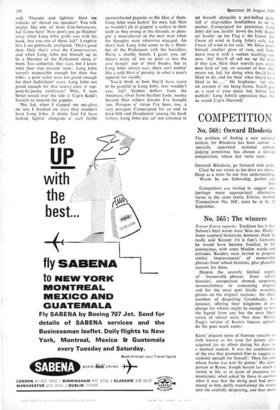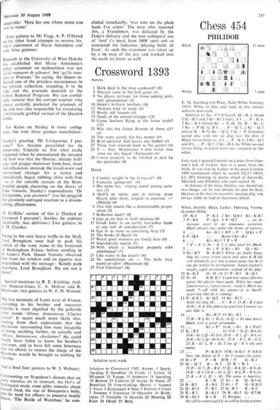COMPETITION
No. 568: Onward Rhodesia
The problem of finding a new national anthem for Rhodesia has been solved: a specially appointed national anthem judging committee has chosen a stirring composition, whose last verse runs: Onwards Rhodesia, go forward with pride, Clear be our vision as the skies are above, Deep as a mine be our true understanding. Warm be our fellowship, perfect our love Competitors are invited to suggest two (perhaps more appropriate) alternative verses in the same metre. Entries, marked 'Competition No. 568', must be in by 12 September.
No. 565: The winners
Trevor Grove reports: Tradition has it that Nelson's final words were 'Kiss me, Hardy.' Some sceptical historians, however, think he really said 'Kismet' ('it is fate'). Certainly he would have become familiar, in his journeyings, with some Muslim words and attitudes. Readers were invited to propose similar 'improvements' of memorable phrases from school histories, plus plausible reasons for them.
Despite the severely limited supply of 'memorable phrases from school histories', competitors showed surprising resourcefulness in concocting original and for the most part fatally revealing glosses on the original versions: the sheer numbers of despairing Crookbacks, for instance, offering their kingdoms in ex- change for whores might be enough to ban the legend from any but the most liber- tarian of school texts. Nor does Martin Fagg's version of Keats's famous epitaph do the poet much credit: Keats' piquant sense of humour remains as little known as his taste for potent ales. acquired (as so often) during his days as a medical student. It was the combination of the two that prompted him to suggest as sardonic epitaph for himself : 'Here lies one whose frame was knit by porter.' His com- panion in Rome, Joseph Severn (as much a victim in life as in paint of excessive ro- manticism), when asked by those in earshot what it was that the dying poet had mur- mured to him, deftly transformed the words into the soulfully despairing, and thus more acceptable: 'Here lies one whose name was writ in water.'
Four guineas to Mr Fagg. A. P. O'Dowd on the other hand attempts to reverse his- tory's indictment of Marie Antoinette and wins three guineas: Research at the University of West Dakota has established that Marie Antoinette's policy statement on malnutrition was not 'qu'ils man gent de gateaux', but 'qu'ils man- gent ce Watteau.' So saying, the Queen in- dicated one of the priceless masterpieces in her private collection, intending it to be ,old, and the proceeds donated to the Urban Renewal Program. We can confid- ently surmise that the corrupt courtier who almost certainly pocketed the proceeds of the sale was also responsible for circulating a maliciously garbled version of the Queen's words.
Tan Kelso on Stanley is more ambig- uous, but wins three guineas nonetheless:
Stanley's greeting, `Dr Livingstone, I pre- sume?' has become proverbial for its pomposity. Unjustly so. For what really happened when he encountered the intrepid old Scot was that the Doctor, already half- gaga and groggy moreover from heat, fever and exhaustion, mistook the travel-worn and sun-stained stranger for a native and immediately began rubbing chins with him -as is the amiable custom of the Bom- bazinini people clustering on the shores of Lake Victoria. Stanley's expostulatory `Dr Livingstone, you presume!' was his priggish but genuinely outraged reaction to a discon- certing effusiveness.
T. Griffiths' version of this is 'Docked at Liverpool I presume'; Stanley, he explains laconically, was delirious.) Two guineas to J. M. Crooks: Owing to the very heavy traffic in the Mall, Lord Brougham once had to park his vehicle of the same name in the forecourt of Buckingham Palace, before strolling in St James's Park. Queen Victoria observed him from the window and an equerry was despatched with the message: 'Kindly park elsewhere, Lord Brougham. We are not a mews.'
Special mentions to R. E. Kitching, And- rew Duncan-Jones, C. A. McIvor and R. Rochester, two guineas to W. F. N. Watson: The last moments of Louis xvtu of France, according to his brother and successor Charles x, were dignified by the gallantly Witty words 'A/Ions, finissons-en. Charles artend.' It seems much more likely that, reading from their expressions that the Physicians surrounding him were incapable of doing anything further, he actually said 'Allons, finissons-en, charlatans!' He could hardly have failed to know his brother's character, and to have felt some bitterness that his efforts to restore the image of the Bourbons would be brought to nothing by Charles.
And a final four guineas to W. J. Webster: Commenting on Napoleon's dictum that an army marches on its stomach. the Duke of Wellington made some pithy remarks about French food, the size of Bonaparte's belly, and the need for officers to preserve bodily fitness. 'The Battle of Waterloo,' he con-
eluded trenchantly, 'was won on the plain feeds I've eaten.' The man who reported this, a Frenchman, was defeated by the Duke's delivery and the new colloquial use of 'feed' ('a meal, feast 1808' mu) and so concocted the ludicrous 'playing fields of Eton'. As such the statement was taken up by a PR man of the day and worked into the myth we know so well.



































 Previous page
Previous page